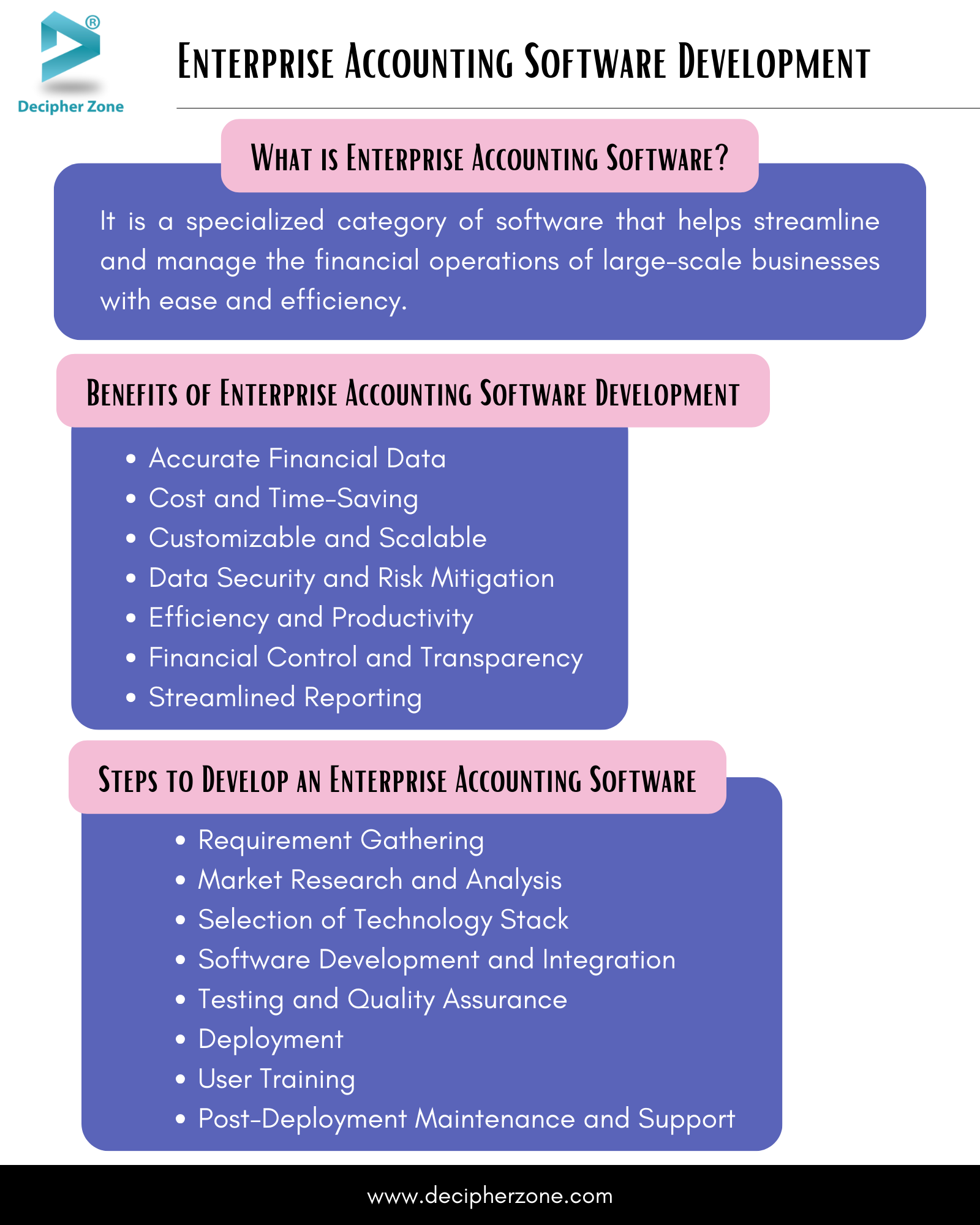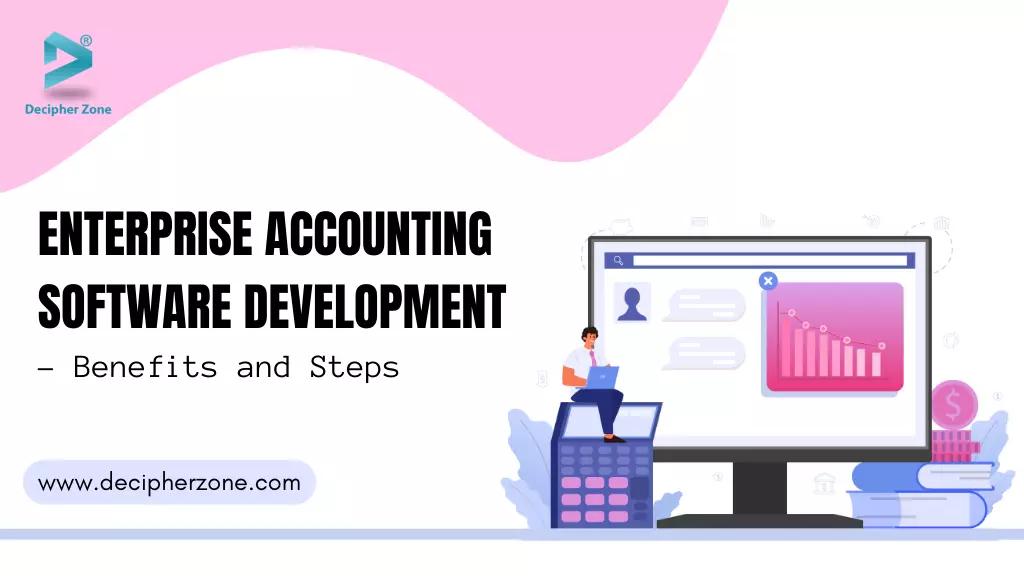Enterprise Accounting Software Development Cost, Benefits and Steps. The intricacies of modern business play an important role in the growth of a business nowadays, and with financial health being a vital factor in the development of a business, it is essential to manage the financial tasks efficiently. And to cater to all the finance-related requirements enterprise accounting software development comes into play.
Read more: Financial Services Software Solutions
If you are a business person or an enterprise thinking about developing enterprise accounting software then this blog is for you! Here we will be filling you up with the benefits of developing enterprise accounting software, along with the most important steps to consider while developing one such software.
Enterprise Accounting Software Developmeny
Enterprise accounting software also known as ERP accounting software is a specialized category of software that helps streamline and manage the financial operations of large-scale businesses and organizations with ease and efficiency.
Read more: Custom Accounting Software: Features, Benefits, and Development Cost
It serves as a central storehouse of all the financial data of a business alongside offering a wide range of features and functionalities like comprehensive financial management, automation, security and compliance, audit trail, and many more to ease the financial tasks and other related processes.
Read more: Financial Software Development Cost, Features and Technologies
Sage Intacct, NetSuite, BlackLine Financial Close Management, Microsoft Dynamics 365 Business Central, Oracle EBS Financials, and Acumatica are some of the best enterprise accounting software that is being widely used in the market.
Benefits of Developing an Enterprise Accounting Software
Developing enterprise accounting software offers innumerable benefits to a business alongside extending its capabilities, and some of the benefits are as follows -
-
Accurate Financial Data
-
Cost and Time-Saving
-
Customizable and Scalable
-
Data Security and Risk Mitigation
-
Efficiency and Productivity
-
Financial Control and Transparency
-
Streamlined Reporting
Read more: Top FinTech Industry Trends
Accurate Financial Data - The primary benefit of developing enterprise accounting software is that it helps in providing accurate financial data along with real-time stats which helps in reducing the risk of possible errors.
Cost and Time-Saving - It helps in saving a lot of time and money by automating the financial tasks and processes, which in turn reduces the manual work and labor costs alongside reducing the efforts and time spent on the work when done manually.
Customizable and Scalable - This software is also customizable which implies that you can customize this software according to changing business needs and unique financial workflows. It also enables you to scale your business by accommodating increased transaction volumes and user numbers.
Data Security and Risk Mitigation - Another benefit of developing enterprise accounting software is that it ensures the security of the financial data with robust security features, and encryption methods alongside mitigating all the possible risks and eliminating the cyber threats.
Read more: What is Cybersecurity? Everything You Need to Know
Efficiency and Productivity - It also helps in enhancing the efficiency of your services, processes, and workflows with automation, which in turn reduces the paperwork alongside the possible manual errors, which in turn helps in improving the productivity of the employees.
Financial Control and Transparency - Furthermore, another important benefit of enterprise accounting software development is that it helps you to closely monitor all the finance-related activities of your business, which in turn helps in improving the company’s financial health as well as ensures that there are no hidden or unaccounted for expenses.
Read more: Expense Management Software Development Cost, Benefits and Features
Streamlined Reporting - Developing enterprise accounting software also helps in providing detailed insights and reports of all the activities like the transactions and other important metrics which enhances the decision-making process, thus enabling you to strategize the business development and ensure revenue growth with ease.

Now that you are familiar with the advantages of developing enterprise accounting software, make sure that you learn about the disadvantages as well and conduct thorough market research alongside SWOT analysis. This will help you develop a future-proof solution for your business and prepare you for the potential challenges that you might come across, during the software development process.
Read more: Software Development Challenges and Solutions
Steps to Develop an Enterprise Accounting Software
The basic steps involved in developing an enterprise accounting software are as follows -
-
Requirement Gathering
-
Market Research and Analysis
-
Selection of Technology Stack
-
Software Development and Integration
-
Testing and Quality Assurance
-
Deployment
-
User Training
-
Post-Deployment Maintenance and Support
Read more: How to Develop a Software from Scratch?
Requirement Gathering - The first step is to clearly define the requirements and objectives that you want in your accounting software alongside the intended scope and optimal feature set.
Market Research and Analysis - Next research your competitors, target audience, and location and identify the market trends and user requirements. This will help you develop a solution that bridges the gap between the requirements of the industry.
Selection of Technology Stack - Now select the appropriate technology stack including programming languages, databases, frameworks, libraries and plugins, and other tools and technologies that fulfill all your project requirements.
Read more: 7 Technologies Shaping The Future of Fintech
Software Development and Integration - Design the UI and integrate the core functionalities into the system alongside security implementations.
Testing and Quality Assurance - Once the solution is developed, you can conduct various levels of software testing to ensure that the solution is error-free and is performing seamlessly as determined before beginning with the development.
Deployment - After the solution has been tested the next step is to deploy the software on the respective platform and make it available for the users.
User Training - The next step is to conduct training sessions to ensure that the users get familiar with the software.
Post-Deployment Maintenance and Support - Once the users learn to use to software properly, the software can now be used in the business and can avail of post-deployment maintenance and support by addressing the issues on the software, releasing updates, and ensuring that the software adapts to the changing environment of the business.
How much does it cost to develop an enterprise accounting software?
The cost of developing enterprise accounting software can range from $50,000 to $4,00,000 and even more depending on the changing business requirements and several other development factors.
Conclusion
In conclusion, developing enterprise accounting software is a complex and dynamic process that involves a lot of planning, effort, and time. But once it is developed you can avail of the innumerable benefits that it provides, alongside streamlining all your financial activities and operations.
So, if you are thinking about developing enterprise accounting software for your business then connect with us, or hire a developer, and get the best solutions developed for your business that are easy-to-use, future-proof, and adaptable.
FAQs about Enterprise Accounting Software Development
What are the key features of enterprise accounting software?
The key features of enterprise accounting software include General Ledger, Multi-entity Accounting, Invoicing, Accounts Receivables and Payables, Payroll management, Employee reimbursement management, Tax management, Fixed asset accounting, Inventory accounting, Reconciliation, Analytics and reporting, and many more.
Can I integrate enterprise accounting software with other business applications?
Yes, you can integrate enterprise accounting software systems with other business apps, which will further help you streamline and improve overall business efficiency.

